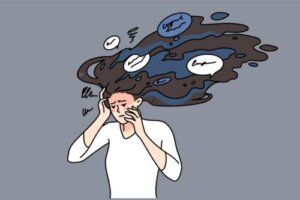Racing Thoughts Syndrome: What Is It and What Causes It?


Written and verified by the psychologist Maria Fatima Seppi Vinuales
Do you feel as if your head is running at a fast pace, as if all your thoughts are running in fast motion and, even if you try to pause them, they don’t stop? This situation is typical of racing thoughts syndrome.
This type of thinking is experienced as a “flood” of ideas. However, in some cases it can lead to creativity and improve our productivity, this effect is only achieved when it happens during a limited period of time. Otherwise, burnout occurs.
What is racing thoughts syndrome?
Racing thought syndrome is related to having a permanently active mind, with a hyper-production of ideas. It is also known as tachypsychia. However, there are professionals who recommend distinguishing the latter concept from accelerated thinking, since it’s more typical in cases of schizophrenia and bipolar disorders.
On the other hand, it’s worth noting that it can affect any age group. Perhaps we used to associate this type of discomfort with the adulthood stage, between 35 and 45 years of age. However, with today’s busy schedules, there’s also accelerated thinking as early as childhood.
The causes of accelerated thinking are multiple. They can range from an obsessive, controlling personality to cultural mandates that reinforce the idea that value is placed on hyper-productivity.
We think you may also enjoy reading this article: 10 Negative Effects of Stress on Your Health To Keep in Mind
The symptoms
Some of the symptoms of fast-paced thinking are as follows:
- Fatigue and tiredness
- Memory deficit
- Mood swings
- Sleep disorders
- Anxiety, nervousness, restlessness
- Difficulties to concentrate, to finish a task
- Psychosomatic symptoms: Allergies, skin rashes, and hair loss

What are the consequences of racing thinking?
It’s important to note the consequences of this syndrome. If we bear in mind that thoughts, emotions, and behaviors go hand in hand, it’s to be expected that the other planes will be affected. For example, we will be irritable and likely have difficulty sleeping.
Since exhaustion and burnout occur, this affects performance. After all, doing or thinking more is not synonymous with doing well or better.
It also impacts our interpersonal relationships and ourselves. We begin to doubt the meaning and purpose of what we do things for. We also lose enthusiasm.
Like this article? You may also like to read: Insomnia Due to Stress: What You Can Do About It
How to avoid racing thinking syndrome
Some of the recommendations to avoid racing thinking are the following:
- Learn to disconnect and respect rest times: We need to be able to detach ourselves from screens, email control, and compulsive consumption of news and networks. We must find moments to simply look at the sky without any other concern, to go for a walk, and to do activities that do us good. In the same vein, the practice of breathing and meditation are also healthy and restorative.
- Take breaks throughout the day and between activities: Avoid strenuous workdays. They don’t have to be long breaks, either – they just need to be there.
- Avoid ending your day with a to-do list: In this way, we get stressed and go to sleep worried. It’s not uncommon that sometimes we even dream about these matters. On the contrary, the best thing to do is to start the day and organize a list of what needs to be done.
- Hierarchize and prioritize: When performing the exercise of the previous point, it’s advisable to choose where to start. Just as time is finite, so is our efficiency, attention, and health.
- Learn to manage emotions and demands: Establish and recognize healthy boundaries. Many times, our accelerated thoughts come from insecurity, perfectionism, and imposter syndrome. That’s why it’s necessary to identify the basis of these ideas and question them in order to replace them with more functional ones.
- Consult a professional: This way, you will work on your anxiety and learn techniques to help you manage your thoughts.

“Infoxication” and the digital world are also to blame
The logic of the 2.0 world is that of non-stop consumption of information, advertising, and videos. Thus, in short periods of time, the brain is exposed to an overwhelming amount of audiovisual stimuli. Gradually, we get used to it and it is difficult to “slow down the rhythm.”
In many cases, we normalize and present working under pressure as a skill. However, we often omit the long-term consequences this has on our health. In the opposite direction, it’s a matter of finding a balance. We must learn that in certain situations we are more stressed and pressured, but this can’t be the norm in our lives.
All cited sources were thoroughly reviewed by our team to ensure their quality, reliability, currency, and validity. The bibliography of this article was considered reliable and of academic or scientific accuracy.
- Ramírez, Luis H. (1977). La técnica del control del pensamiento en terapia comportamental. Revista Latinoamericana de Psicología, 9(2),213-229.[fecha de Consulta 16 de Septiembre de 2022]. ISSN: 0120-0534. Disponible en: https://www.redalyc.org/articulo.oa?id=80590204
- Zubeidat, Ihab, & Sierra, Juan Carlos, & Ortega, Virgilio (2003). Ansiedad, angustia y estrés: tres conceptosa diferenciar. Revista Mal-estar E Subjetividade, 3(1),10 – 59.[fecha de Consulta 16 de Septiembre de 2022]. ISSN: 1518-6148. Disponible en: https://www.redalyc.org/articulo.oa?id=27130102
This text is provided for informational purposes only and does not replace consultation with a professional. If in doubt, consult your specialist.








